ACCY902 - Harmonizing Accounting: Analysis of UK and US Standards
VerifiedAdded on 2023/06/10
|16
|4115
|119
Report
AI Summary
This report examines the harmonization of accounting standards between the UK and the US, focusing on the challenges and benefits of converging national accounting practices with International Financial Reporting Standards (IFRS). The study utilizes secondary data analysis to explore the linguistic, political, and cultural ambiguities inherent in translating accounting standards. It highlights the potential for improved consistency, transparency, and comparability in financial reporting through harmonization, which can foster investor confidence and reduce the cost of raising capital. The report also addresses the complexities faced by multinational corporations in preparing consolidated financial statements under differing accounting standards and discusses the role of mutual recognition and reconciliation in facilitating cross-border financial reporting. Ultimately, the analysis emphasizes that while complete harmonization remains a challenge, it represents a crucial step towards creating a common global accounting language.
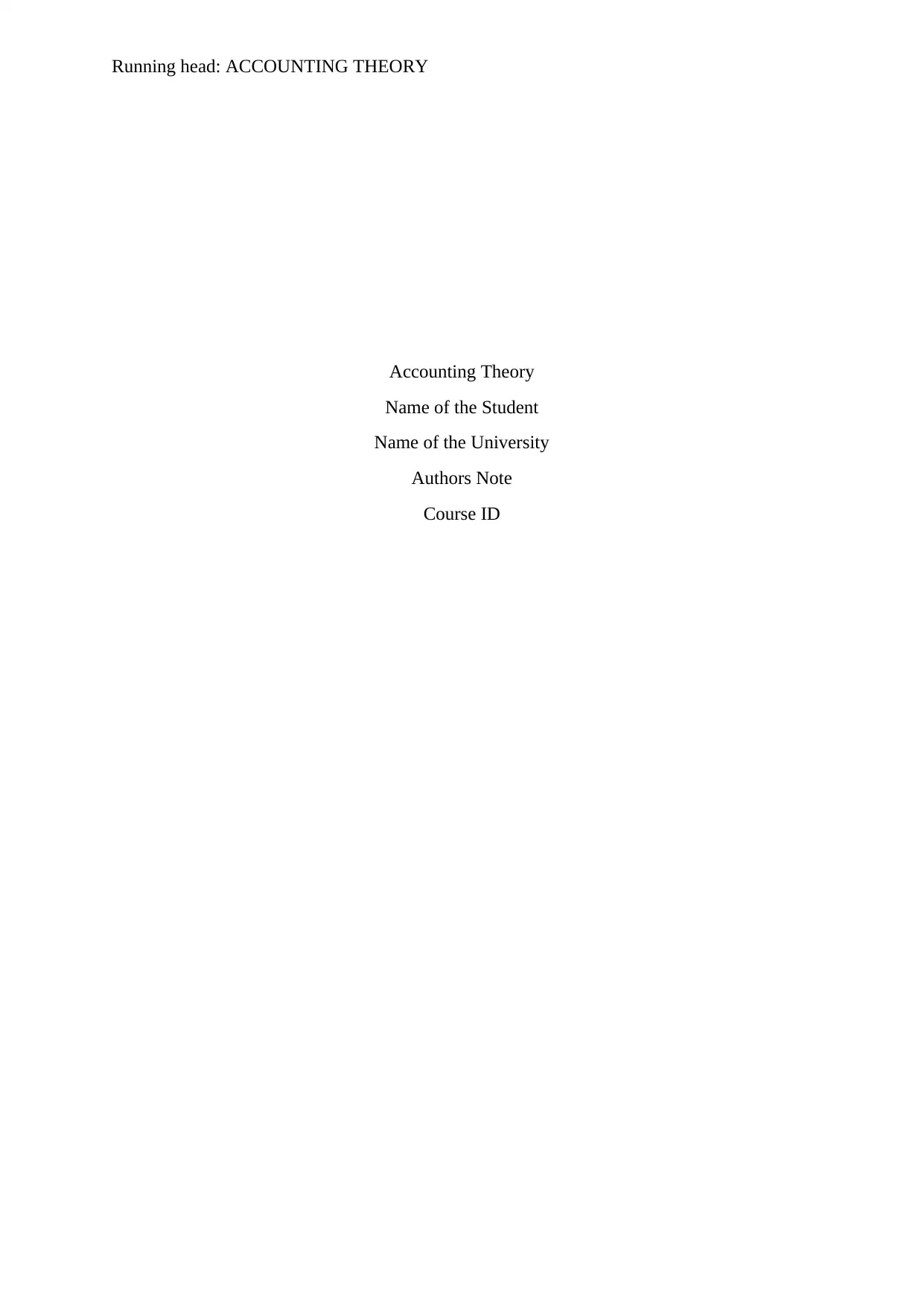
Running head: ACCOUNTING THEORY
Accounting Theory
Name of the Student
Name of the University
Authors Note
Course ID
Accounting Theory
Name of the Student
Name of the University
Authors Note
Course ID
Paraphrase This Document
Need a fresh take? Get an instant paraphrase of this document with our AI Paraphraser
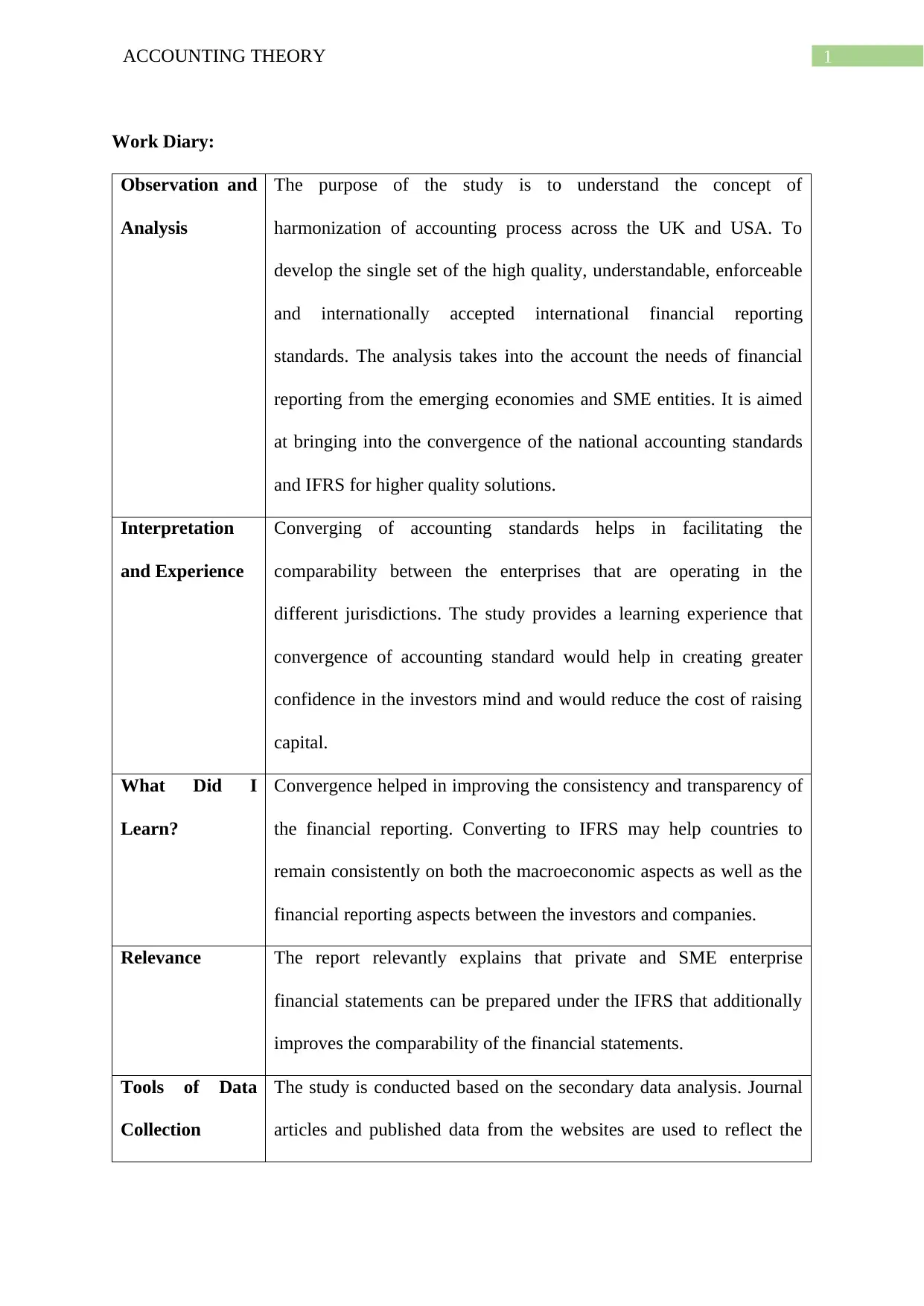
1ACCOUNTING THEORY
Work Diary:
Observation and
Analysis
The purpose of the study is to understand the concept of
harmonization of accounting process across the UK and USA. To
develop the single set of the high quality, understandable, enforceable
and internationally accepted international financial reporting
standards. The analysis takes into the account the needs of financial
reporting from the emerging economies and SME entities. It is aimed
at bringing into the convergence of the national accounting standards
and IFRS for higher quality solutions.
Interpretation
and Experience
Converging of accounting standards helps in facilitating the
comparability between the enterprises that are operating in the
different jurisdictions. The study provides a learning experience that
convergence of accounting standard would help in creating greater
confidence in the investors mind and would reduce the cost of raising
capital.
What Did I
Learn?
Convergence helped in improving the consistency and transparency of
the financial reporting. Converting to IFRS may help countries to
remain consistently on both the macroeconomic aspects as well as the
financial reporting aspects between the investors and companies.
Relevance The report relevantly explains that private and SME enterprise
financial statements can be prepared under the IFRS that additionally
improves the comparability of the financial statements.
Tools of Data
Collection
The study is conducted based on the secondary data analysis. Journal
articles and published data from the websites are used to reflect the
Work Diary:
Observation and
Analysis
The purpose of the study is to understand the concept of
harmonization of accounting process across the UK and USA. To
develop the single set of the high quality, understandable, enforceable
and internationally accepted international financial reporting
standards. The analysis takes into the account the needs of financial
reporting from the emerging economies and SME entities. It is aimed
at bringing into the convergence of the national accounting standards
and IFRS for higher quality solutions.
Interpretation
and Experience
Converging of accounting standards helps in facilitating the
comparability between the enterprises that are operating in the
different jurisdictions. The study provides a learning experience that
convergence of accounting standard would help in creating greater
confidence in the investors mind and would reduce the cost of raising
capital.
What Did I
Learn?
Convergence helped in improving the consistency and transparency of
the financial reporting. Converting to IFRS may help countries to
remain consistently on both the macroeconomic aspects as well as the
financial reporting aspects between the investors and companies.
Relevance The report relevantly explains that private and SME enterprise
financial statements can be prepared under the IFRS that additionally
improves the comparability of the financial statements.
Tools of Data
Collection
The study is conducted based on the secondary data analysis. Journal
articles and published data from the websites are used to reflect the
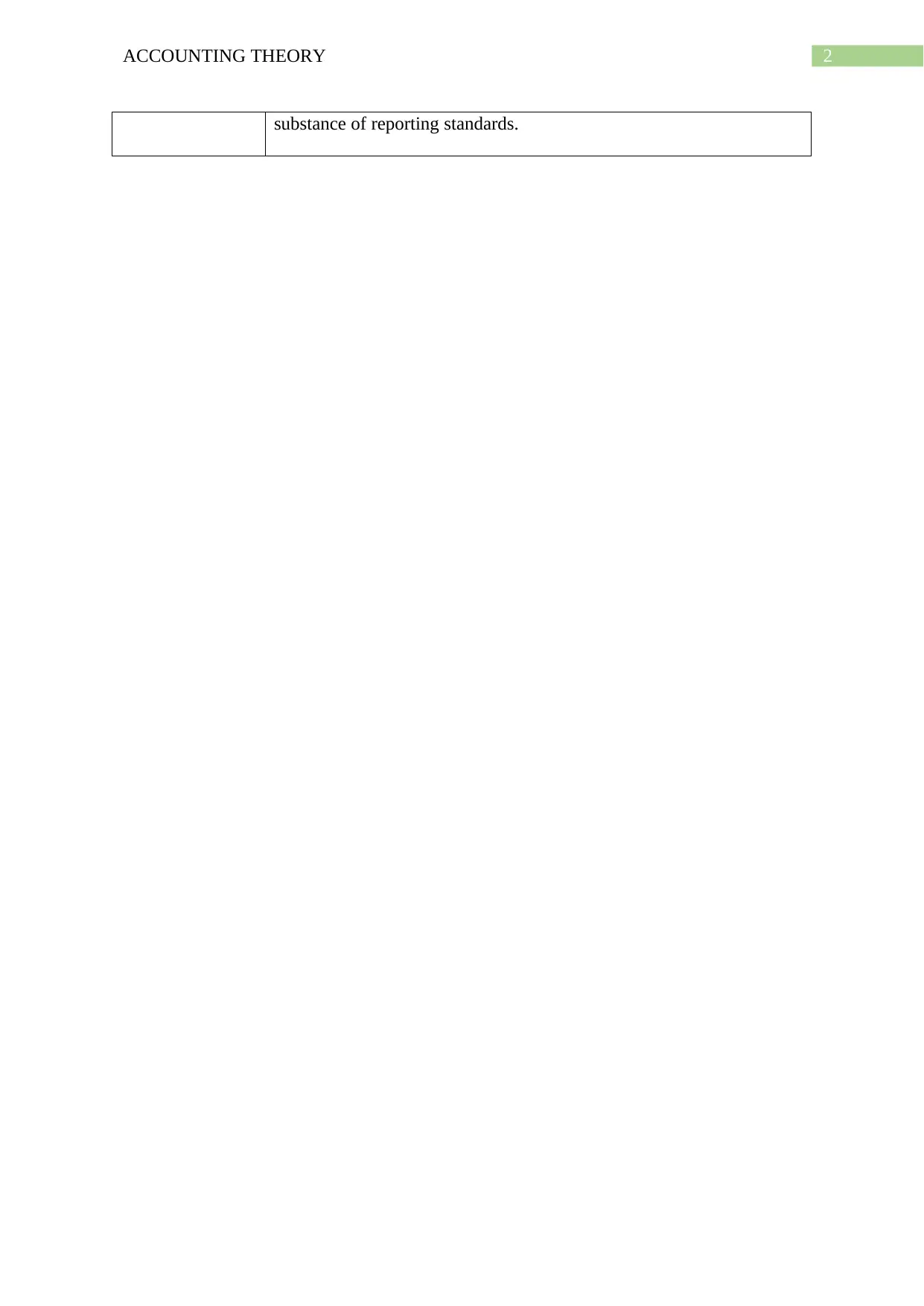
2ACCOUNTING THEORY
substance of reporting standards.
substance of reporting standards.
⊘ This is a preview!⊘
Do you want full access?
Subscribe today to unlock all pages.

Trusted by 1+ million students worldwide
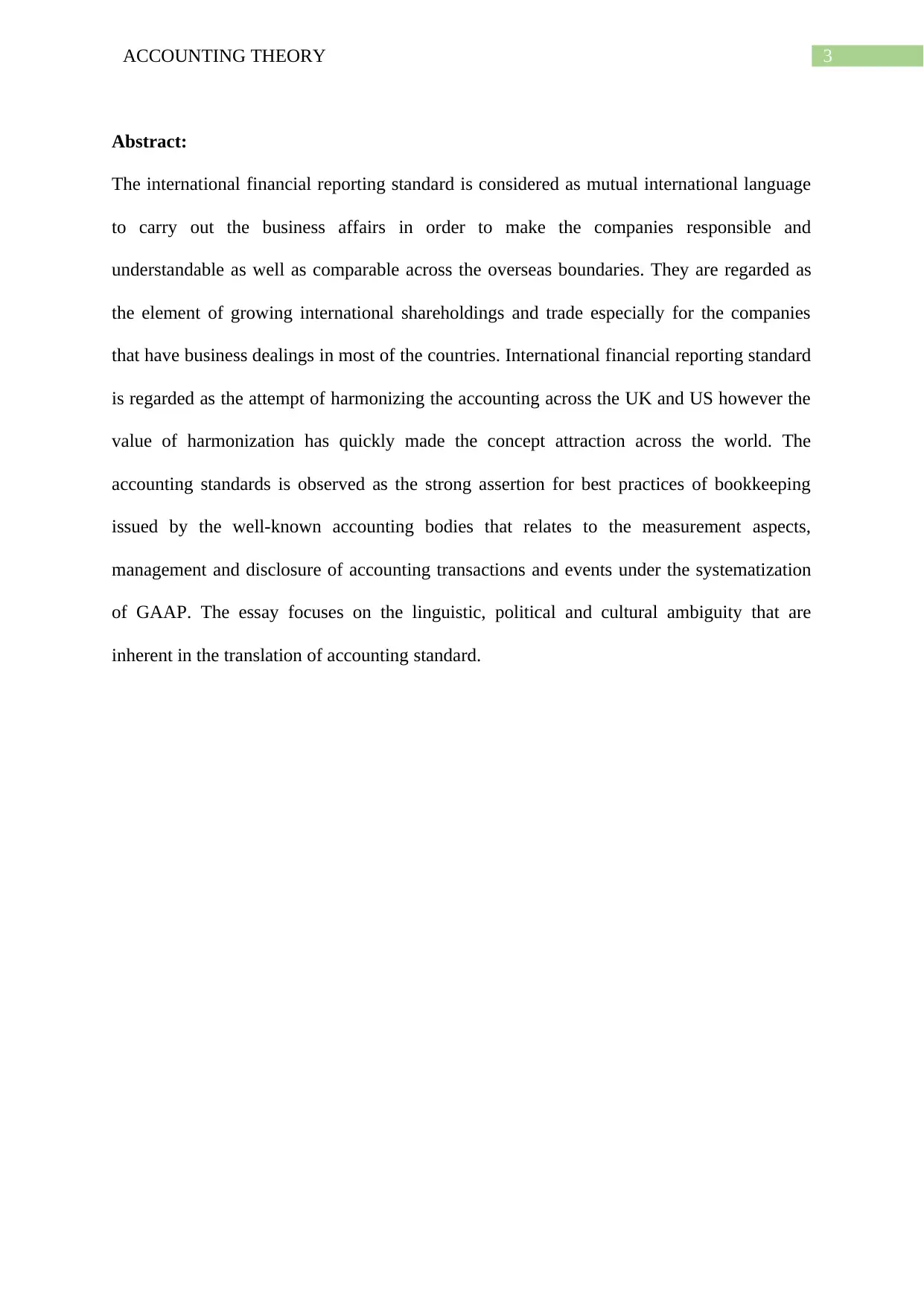
3ACCOUNTING THEORY
Abstract:
The international financial reporting standard is considered as mutual international language
to carry out the business affairs in order to make the companies responsible and
understandable as well as comparable across the overseas boundaries. They are regarded as
the element of growing international shareholdings and trade especially for the companies
that have business dealings in most of the countries. International financial reporting standard
is regarded as the attempt of harmonizing the accounting across the UK and US however the
value of harmonization has quickly made the concept attraction across the world. The
accounting standards is observed as the strong assertion for best practices of bookkeeping
issued by the well-known accounting bodies that relates to the measurement aspects,
management and disclosure of accounting transactions and events under the systematization
of GAAP. The essay focuses on the linguistic, political and cultural ambiguity that are
inherent in the translation of accounting standard.
Abstract:
The international financial reporting standard is considered as mutual international language
to carry out the business affairs in order to make the companies responsible and
understandable as well as comparable across the overseas boundaries. They are regarded as
the element of growing international shareholdings and trade especially for the companies
that have business dealings in most of the countries. International financial reporting standard
is regarded as the attempt of harmonizing the accounting across the UK and US however the
value of harmonization has quickly made the concept attraction across the world. The
accounting standards is observed as the strong assertion for best practices of bookkeeping
issued by the well-known accounting bodies that relates to the measurement aspects,
management and disclosure of accounting transactions and events under the systematization
of GAAP. The essay focuses on the linguistic, political and cultural ambiguity that are
inherent in the translation of accounting standard.
Paraphrase This Document
Need a fresh take? Get an instant paraphrase of this document with our AI Paraphraser
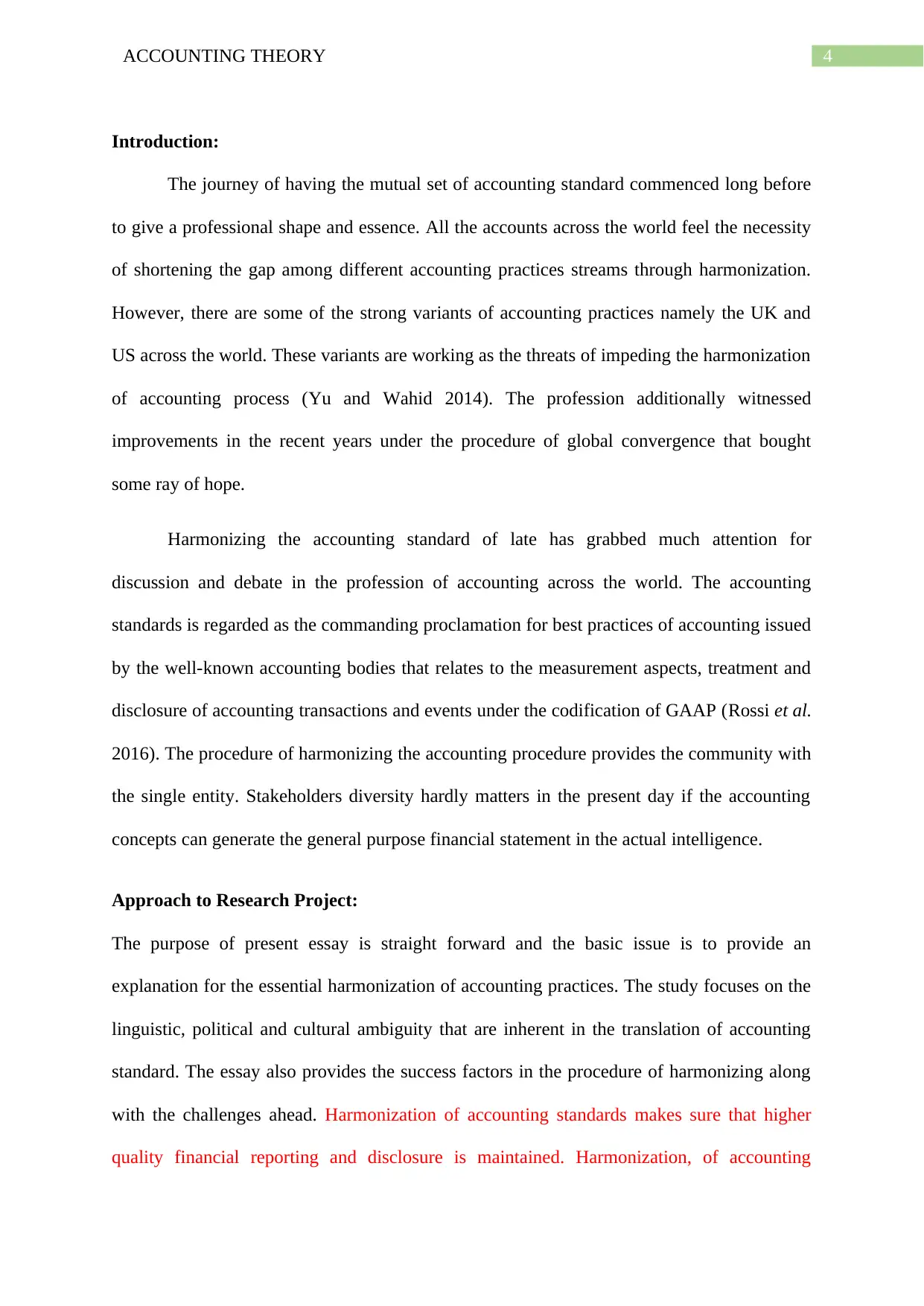
4ACCOUNTING THEORY
Introduction:
The journey of having the mutual set of accounting standard commenced long before
to give a professional shape and essence. All the accounts across the world feel the necessity
of shortening the gap among different accounting practices streams through harmonization.
However, there are some of the strong variants of accounting practices namely the UK and
US across the world. These variants are working as the threats of impeding the harmonization
of accounting process (Yu and Wahid 2014). The profession additionally witnessed
improvements in the recent years under the procedure of global convergence that bought
some ray of hope.
Harmonizing the accounting standard of late has grabbed much attention for
discussion and debate in the profession of accounting across the world. The accounting
standards is regarded as the commanding proclamation for best practices of accounting issued
by the well-known accounting bodies that relates to the measurement aspects, treatment and
disclosure of accounting transactions and events under the codification of GAAP (Rossi et al.
2016). The procedure of harmonizing the accounting procedure provides the community with
the single entity. Stakeholders diversity hardly matters in the present day if the accounting
concepts can generate the general purpose financial statement in the actual intelligence.
Approach to Research Project:
The purpose of present essay is straight forward and the basic issue is to provide an
explanation for the essential harmonization of accounting practices. The study focuses on the
linguistic, political and cultural ambiguity that are inherent in the translation of accounting
standard. The essay also provides the success factors in the procedure of harmonizing along
with the challenges ahead. Harmonization of accounting standards makes sure that higher
quality financial reporting and disclosure is maintained. Harmonization, of accounting
Introduction:
The journey of having the mutual set of accounting standard commenced long before
to give a professional shape and essence. All the accounts across the world feel the necessity
of shortening the gap among different accounting practices streams through harmonization.
However, there are some of the strong variants of accounting practices namely the UK and
US across the world. These variants are working as the threats of impeding the harmonization
of accounting process (Yu and Wahid 2014). The profession additionally witnessed
improvements in the recent years under the procedure of global convergence that bought
some ray of hope.
Harmonizing the accounting standard of late has grabbed much attention for
discussion and debate in the profession of accounting across the world. The accounting
standards is regarded as the commanding proclamation for best practices of accounting issued
by the well-known accounting bodies that relates to the measurement aspects, treatment and
disclosure of accounting transactions and events under the codification of GAAP (Rossi et al.
2016). The procedure of harmonizing the accounting procedure provides the community with
the single entity. Stakeholders diversity hardly matters in the present day if the accounting
concepts can generate the general purpose financial statement in the actual intelligence.
Approach to Research Project:
The purpose of present essay is straight forward and the basic issue is to provide an
explanation for the essential harmonization of accounting practices. The study focuses on the
linguistic, political and cultural ambiguity that are inherent in the translation of accounting
standard. The essay also provides the success factors in the procedure of harmonizing along
with the challenges ahead. Harmonization of accounting standards makes sure that higher
quality financial reporting and disclosure is maintained. Harmonization, of accounting
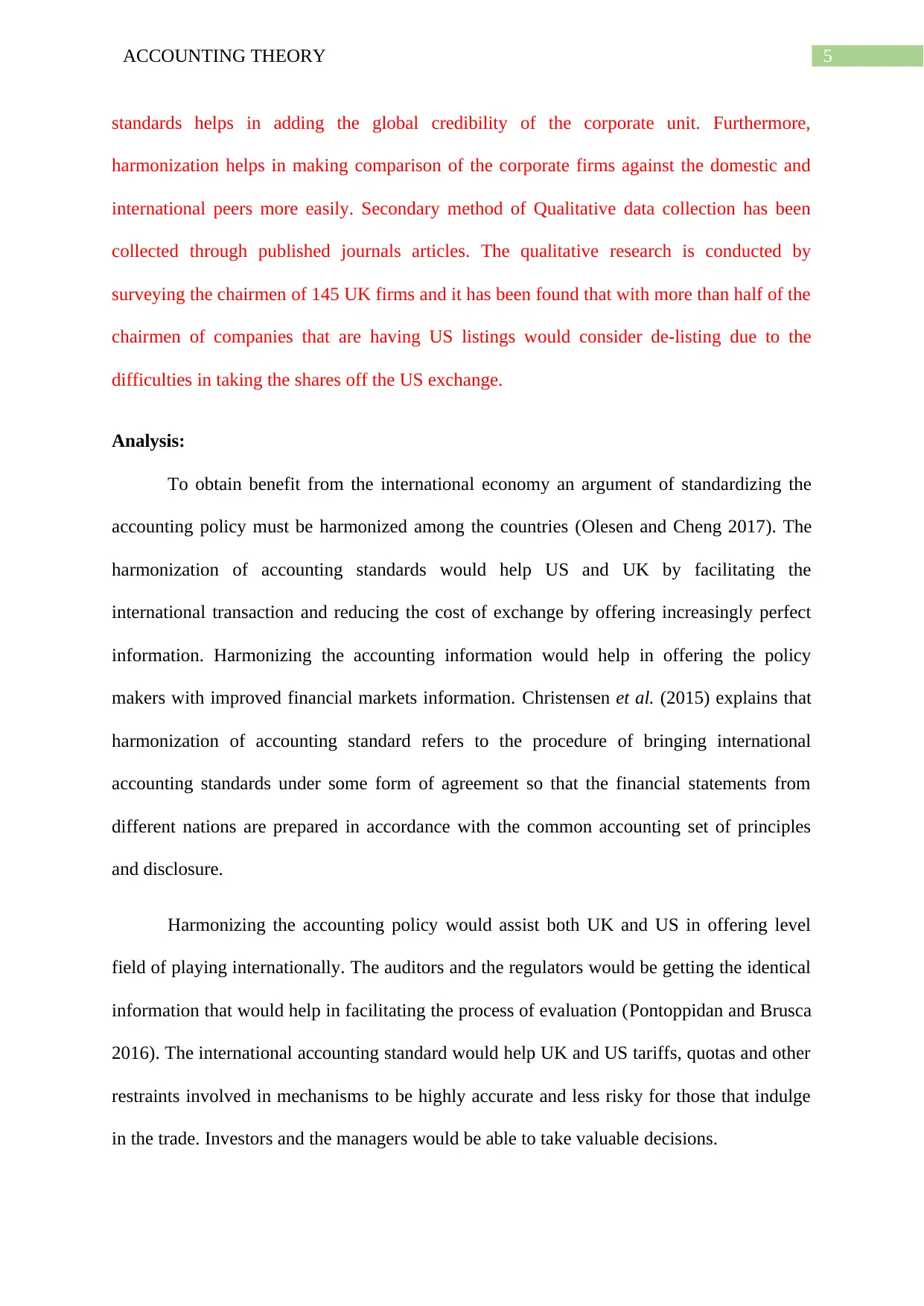
5ACCOUNTING THEORY
standards helps in adding the global credibility of the corporate unit. Furthermore,
harmonization helps in making comparison of the corporate firms against the domestic and
international peers more easily. Secondary method of Qualitative data collection has been
collected through published journals articles. The qualitative research is conducted by
surveying the chairmen of 145 UK firms and it has been found that with more than half of the
chairmen of companies that are having US listings would consider de-listing due to the
difficulties in taking the shares off the US exchange.
Analysis:
To obtain benefit from the international economy an argument of standardizing the
accounting policy must be harmonized among the countries (Olesen and Cheng 2017). The
harmonization of accounting standards would help US and UK by facilitating the
international transaction and reducing the cost of exchange by offering increasingly perfect
information. Harmonizing the accounting information would help in offering the policy
makers with improved financial markets information. Christensen et al. (2015) explains that
harmonization of accounting standard refers to the procedure of bringing international
accounting standards under some form of agreement so that the financial statements from
different nations are prepared in accordance with the common accounting set of principles
and disclosure.
Harmonizing the accounting policy would assist both UK and US in offering level
field of playing internationally. The auditors and the regulators would be getting the identical
information that would help in facilitating the process of evaluation (Pontoppidan and Brusca
2016). The international accounting standard would help UK and US tariffs, quotas and other
restraints involved in mechanisms to be highly accurate and less risky for those that indulge
in the trade. Investors and the managers would be able to take valuable decisions.
standards helps in adding the global credibility of the corporate unit. Furthermore,
harmonization helps in making comparison of the corporate firms against the domestic and
international peers more easily. Secondary method of Qualitative data collection has been
collected through published journals articles. The qualitative research is conducted by
surveying the chairmen of 145 UK firms and it has been found that with more than half of the
chairmen of companies that are having US listings would consider de-listing due to the
difficulties in taking the shares off the US exchange.
Analysis:
To obtain benefit from the international economy an argument of standardizing the
accounting policy must be harmonized among the countries (Olesen and Cheng 2017). The
harmonization of accounting standards would help US and UK by facilitating the
international transaction and reducing the cost of exchange by offering increasingly perfect
information. Harmonizing the accounting information would help in offering the policy
makers with improved financial markets information. Christensen et al. (2015) explains that
harmonization of accounting standard refers to the procedure of bringing international
accounting standards under some form of agreement so that the financial statements from
different nations are prepared in accordance with the common accounting set of principles
and disclosure.
Harmonizing the accounting policy would assist both UK and US in offering level
field of playing internationally. The auditors and the regulators would be getting the identical
information that would help in facilitating the process of evaluation (Pontoppidan and Brusca
2016). The international accounting standard would help UK and US tariffs, quotas and other
restraints involved in mechanisms to be highly accurate and less risky for those that indulge
in the trade. Investors and the managers would be able to take valuable decisions.
⊘ This is a preview!⊘
Do you want full access?
Subscribe today to unlock all pages.

Trusted by 1+ million students worldwide
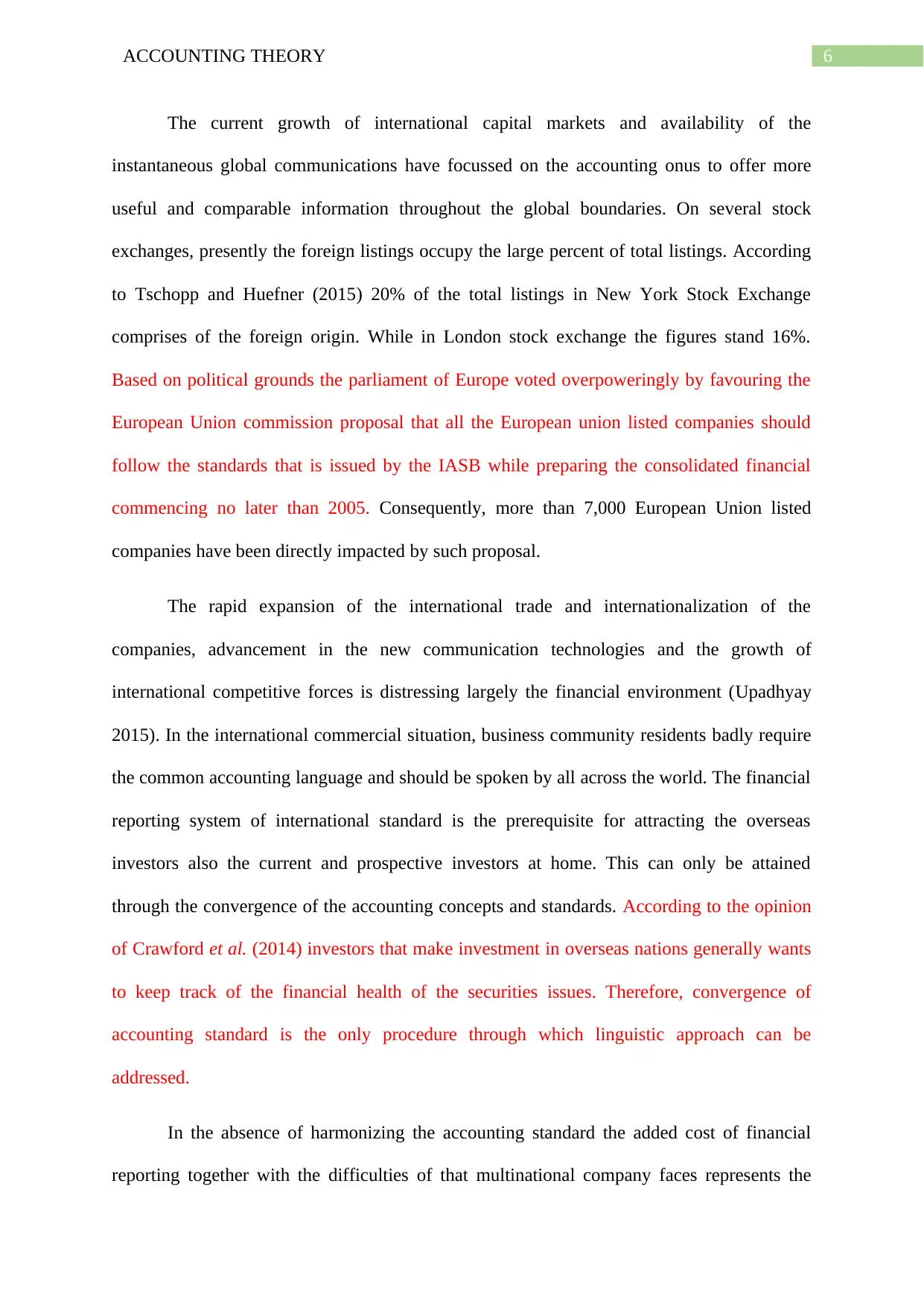
6ACCOUNTING THEORY
The current growth of international capital markets and availability of the
instantaneous global communications have focussed on the accounting onus to offer more
useful and comparable information throughout the global boundaries. On several stock
exchanges, presently the foreign listings occupy the large percent of total listings. According
to Tschopp and Huefner (2015) 20% of the total listings in New York Stock Exchange
comprises of the foreign origin. While in London stock exchange the figures stand 16%.
Based on political grounds the parliament of Europe voted overpoweringly by favouring the
European Union commission proposal that all the European union listed companies should
follow the standards that is issued by the IASB while preparing the consolidated financial
commencing no later than 2005. Consequently, more than 7,000 European Union listed
companies have been directly impacted by such proposal.
The rapid expansion of the international trade and internationalization of the
companies, advancement in the new communication technologies and the growth of
international competitive forces is distressing largely the financial environment (Upadhyay
2015). In the international commercial situation, business community residents badly require
the common accounting language and should be spoken by all across the world. The financial
reporting system of international standard is the prerequisite for attracting the overseas
investors also the current and prospective investors at home. This can only be attained
through the convergence of the accounting concepts and standards. According to the opinion
of Crawford et al. (2014) investors that make investment in overseas nations generally wants
to keep track of the financial health of the securities issues. Therefore, convergence of
accounting standard is the only procedure through which linguistic approach can be
addressed.
In the absence of harmonizing the accounting standard the added cost of financial
reporting together with the difficulties of that multinational company faces represents the
The current growth of international capital markets and availability of the
instantaneous global communications have focussed on the accounting onus to offer more
useful and comparable information throughout the global boundaries. On several stock
exchanges, presently the foreign listings occupy the large percent of total listings. According
to Tschopp and Huefner (2015) 20% of the total listings in New York Stock Exchange
comprises of the foreign origin. While in London stock exchange the figures stand 16%.
Based on political grounds the parliament of Europe voted overpoweringly by favouring the
European Union commission proposal that all the European union listed companies should
follow the standards that is issued by the IASB while preparing the consolidated financial
commencing no later than 2005. Consequently, more than 7,000 European Union listed
companies have been directly impacted by such proposal.
The rapid expansion of the international trade and internationalization of the
companies, advancement in the new communication technologies and the growth of
international competitive forces is distressing largely the financial environment (Upadhyay
2015). In the international commercial situation, business community residents badly require
the common accounting language and should be spoken by all across the world. The financial
reporting system of international standard is the prerequisite for attracting the overseas
investors also the current and prospective investors at home. This can only be attained
through the convergence of the accounting concepts and standards. According to the opinion
of Crawford et al. (2014) investors that make investment in overseas nations generally wants
to keep track of the financial health of the securities issues. Therefore, convergence of
accounting standard is the only procedure through which linguistic approach can be
addressed.
In the absence of harmonizing the accounting standard the added cost of financial
reporting together with the difficulties of that multinational company faces represents the
Paraphrase This Document
Need a fresh take? Get an instant paraphrase of this document with our AI Paraphraser
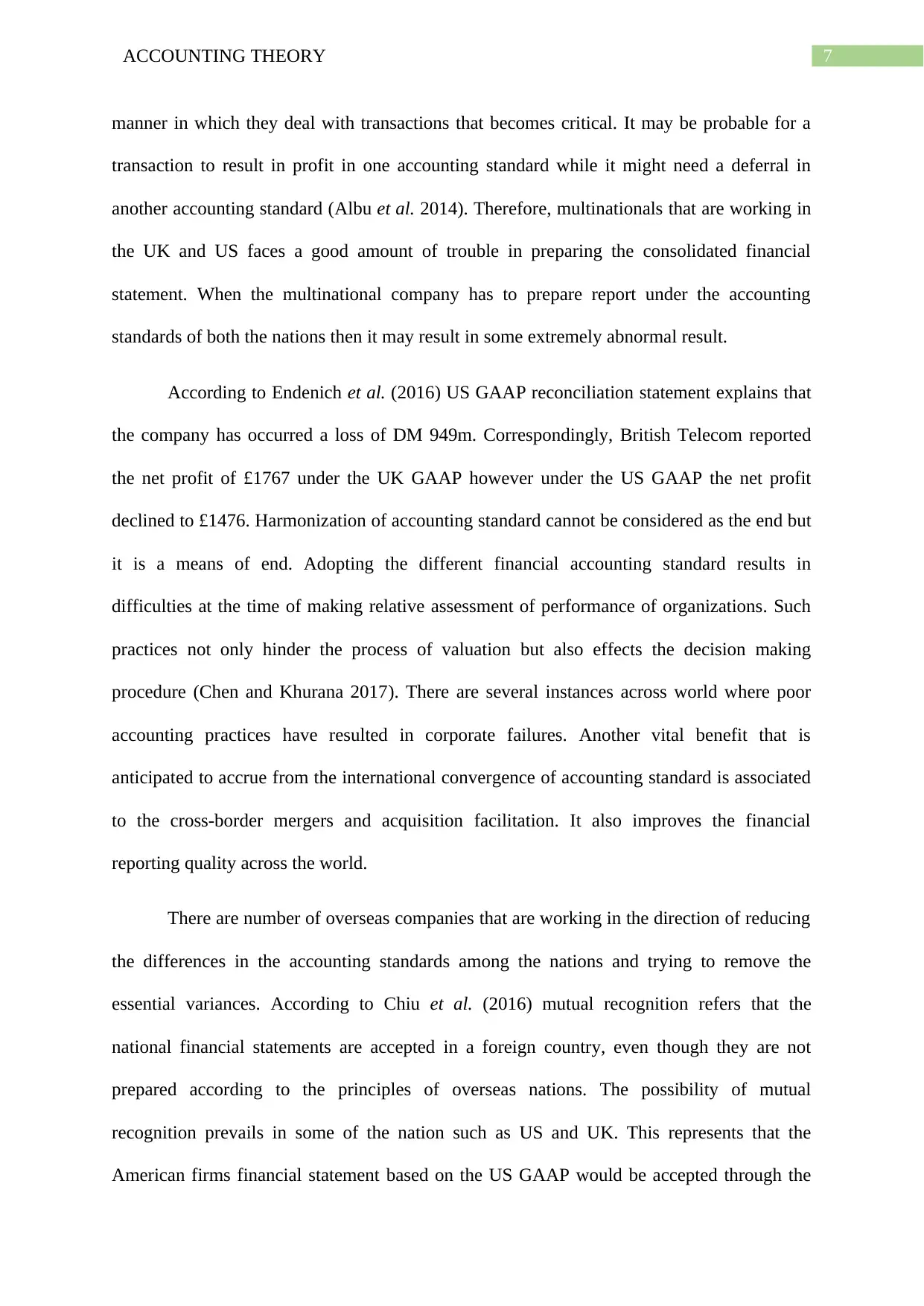
7ACCOUNTING THEORY
manner in which they deal with transactions that becomes critical. It may be probable for a
transaction to result in profit in one accounting standard while it might need a deferral in
another accounting standard (Albu et al. 2014). Therefore, multinationals that are working in
the UK and US faces a good amount of trouble in preparing the consolidated financial
statement. When the multinational company has to prepare report under the accounting
standards of both the nations then it may result in some extremely abnormal result.
According to Endenich et al. (2016) US GAAP reconciliation statement explains that
the company has occurred a loss of DM 949m. Correspondingly, British Telecom reported
the net profit of £1767 under the UK GAAP however under the US GAAP the net profit
declined to £1476. Harmonization of accounting standard cannot be considered as the end but
it is a means of end. Adopting the different financial accounting standard results in
difficulties at the time of making relative assessment of performance of organizations. Such
practices not only hinder the process of valuation but also effects the decision making
procedure (Chen and Khurana 2017). There are several instances across world where poor
accounting practices have resulted in corporate failures. Another vital benefit that is
anticipated to accrue from the international convergence of accounting standard is associated
to the cross-border mergers and acquisition facilitation. It also improves the financial
reporting quality across the world.
There are number of overseas companies that are working in the direction of reducing
the differences in the accounting standards among the nations and trying to remove the
essential variances. According to Chiu et al. (2016) mutual recognition refers that the
national financial statements are accepted in a foreign country, even though they are not
prepared according to the principles of overseas nations. The possibility of mutual
recognition prevails in some of the nation such as US and UK. This represents that the
American firms financial statement based on the US GAAP would be accepted through the
manner in which they deal with transactions that becomes critical. It may be probable for a
transaction to result in profit in one accounting standard while it might need a deferral in
another accounting standard (Albu et al. 2014). Therefore, multinationals that are working in
the UK and US faces a good amount of trouble in preparing the consolidated financial
statement. When the multinational company has to prepare report under the accounting
standards of both the nations then it may result in some extremely abnormal result.
According to Endenich et al. (2016) US GAAP reconciliation statement explains that
the company has occurred a loss of DM 949m. Correspondingly, British Telecom reported
the net profit of £1767 under the UK GAAP however under the US GAAP the net profit
declined to £1476. Harmonization of accounting standard cannot be considered as the end but
it is a means of end. Adopting the different financial accounting standard results in
difficulties at the time of making relative assessment of performance of organizations. Such
practices not only hinder the process of valuation but also effects the decision making
procedure (Chen and Khurana 2017). There are several instances across world where poor
accounting practices have resulted in corporate failures. Another vital benefit that is
anticipated to accrue from the international convergence of accounting standard is associated
to the cross-border mergers and acquisition facilitation. It also improves the financial
reporting quality across the world.
There are number of overseas companies that are working in the direction of reducing
the differences in the accounting standards among the nations and trying to remove the
essential variances. According to Chiu et al. (2016) mutual recognition refers that the
national financial statements are accepted in a foreign country, even though they are not
prepared according to the principles of overseas nations. The possibility of mutual
recognition prevails in some of the nation such as US and UK. This represents that the
American firms financial statement based on the US GAAP would be accepted through the
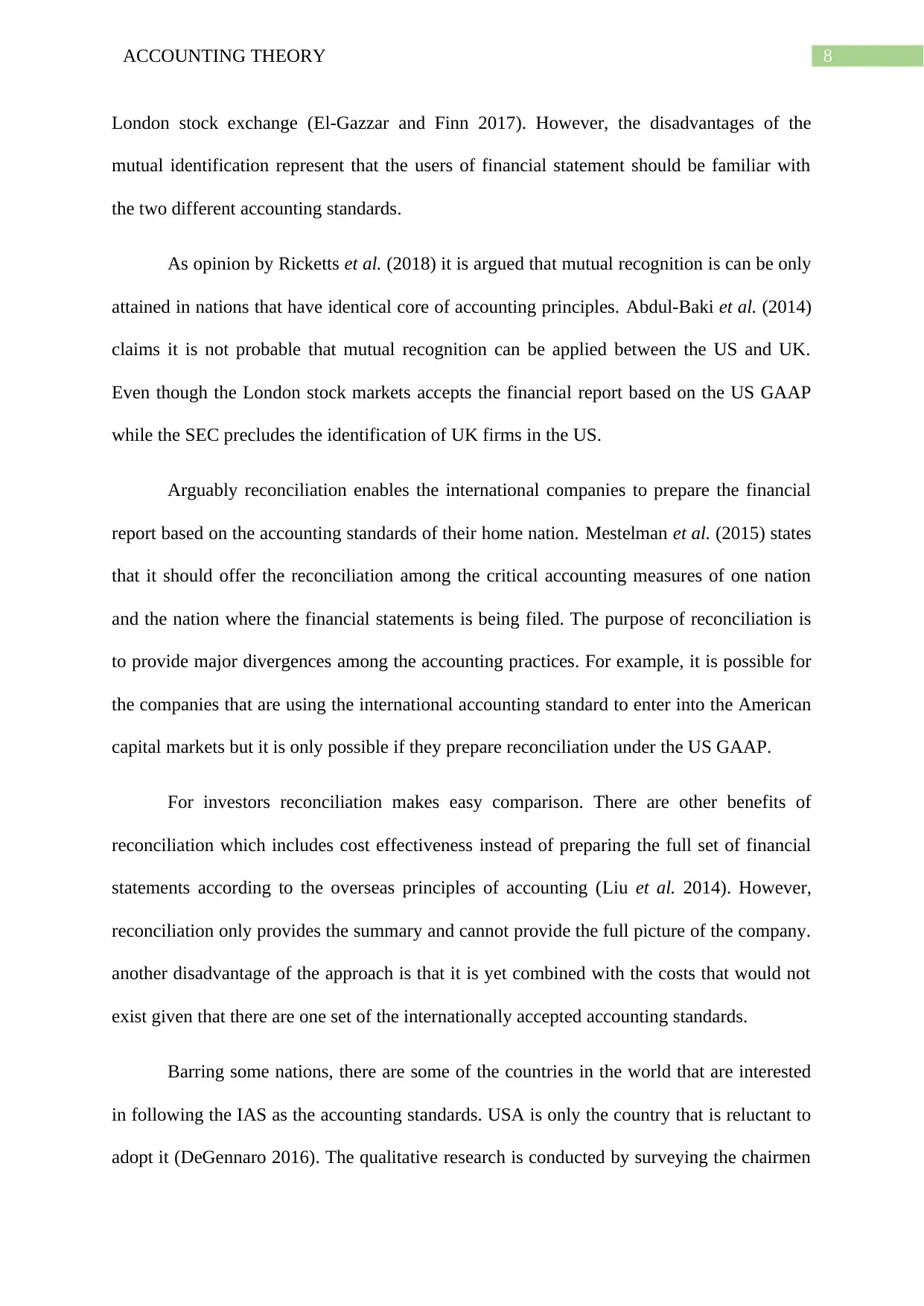
8ACCOUNTING THEORY
London stock exchange (El-Gazzar and Finn 2017). However, the disadvantages of the
mutual identification represent that the users of financial statement should be familiar with
the two different accounting standards.
As opinion by Ricketts et al. (2018) it is argued that mutual recognition is can be only
attained in nations that have identical core of accounting principles. Abdul-Baki et al. (2014)
claims it is not probable that mutual recognition can be applied between the US and UK.
Even though the London stock markets accepts the financial report based on the US GAAP
while the SEC precludes the identification of UK firms in the US.
Arguably reconciliation enables the international companies to prepare the financial
report based on the accounting standards of their home nation. Mestelman et al. (2015) states
that it should offer the reconciliation among the critical accounting measures of one nation
and the nation where the financial statements is being filed. The purpose of reconciliation is
to provide major divergences among the accounting practices. For example, it is possible for
the companies that are using the international accounting standard to enter into the American
capital markets but it is only possible if they prepare reconciliation under the US GAAP.
For investors reconciliation makes easy comparison. There are other benefits of
reconciliation which includes cost effectiveness instead of preparing the full set of financial
statements according to the overseas principles of accounting (Liu et al. 2014). However,
reconciliation only provides the summary and cannot provide the full picture of the company.
another disadvantage of the approach is that it is yet combined with the costs that would not
exist given that there are one set of the internationally accepted accounting standards.
Barring some nations, there are some of the countries in the world that are interested
in following the IAS as the accounting standards. USA is only the country that is reluctant to
adopt it (DeGennaro 2016). The qualitative research is conducted by surveying the chairmen
London stock exchange (El-Gazzar and Finn 2017). However, the disadvantages of the
mutual identification represent that the users of financial statement should be familiar with
the two different accounting standards.
As opinion by Ricketts et al. (2018) it is argued that mutual recognition is can be only
attained in nations that have identical core of accounting principles. Abdul-Baki et al. (2014)
claims it is not probable that mutual recognition can be applied between the US and UK.
Even though the London stock markets accepts the financial report based on the US GAAP
while the SEC precludes the identification of UK firms in the US.
Arguably reconciliation enables the international companies to prepare the financial
report based on the accounting standards of their home nation. Mestelman et al. (2015) states
that it should offer the reconciliation among the critical accounting measures of one nation
and the nation where the financial statements is being filed. The purpose of reconciliation is
to provide major divergences among the accounting practices. For example, it is possible for
the companies that are using the international accounting standard to enter into the American
capital markets but it is only possible if they prepare reconciliation under the US GAAP.
For investors reconciliation makes easy comparison. There are other benefits of
reconciliation which includes cost effectiveness instead of preparing the full set of financial
statements according to the overseas principles of accounting (Liu et al. 2014). However,
reconciliation only provides the summary and cannot provide the full picture of the company.
another disadvantage of the approach is that it is yet combined with the costs that would not
exist given that there are one set of the internationally accepted accounting standards.
Barring some nations, there are some of the countries in the world that are interested
in following the IAS as the accounting standards. USA is only the country that is reluctant to
adopt it (DeGennaro 2016). The qualitative research is conducted by surveying the chairmen
⊘ This is a preview!⊘
Do you want full access?
Subscribe today to unlock all pages.

Trusted by 1+ million students worldwide
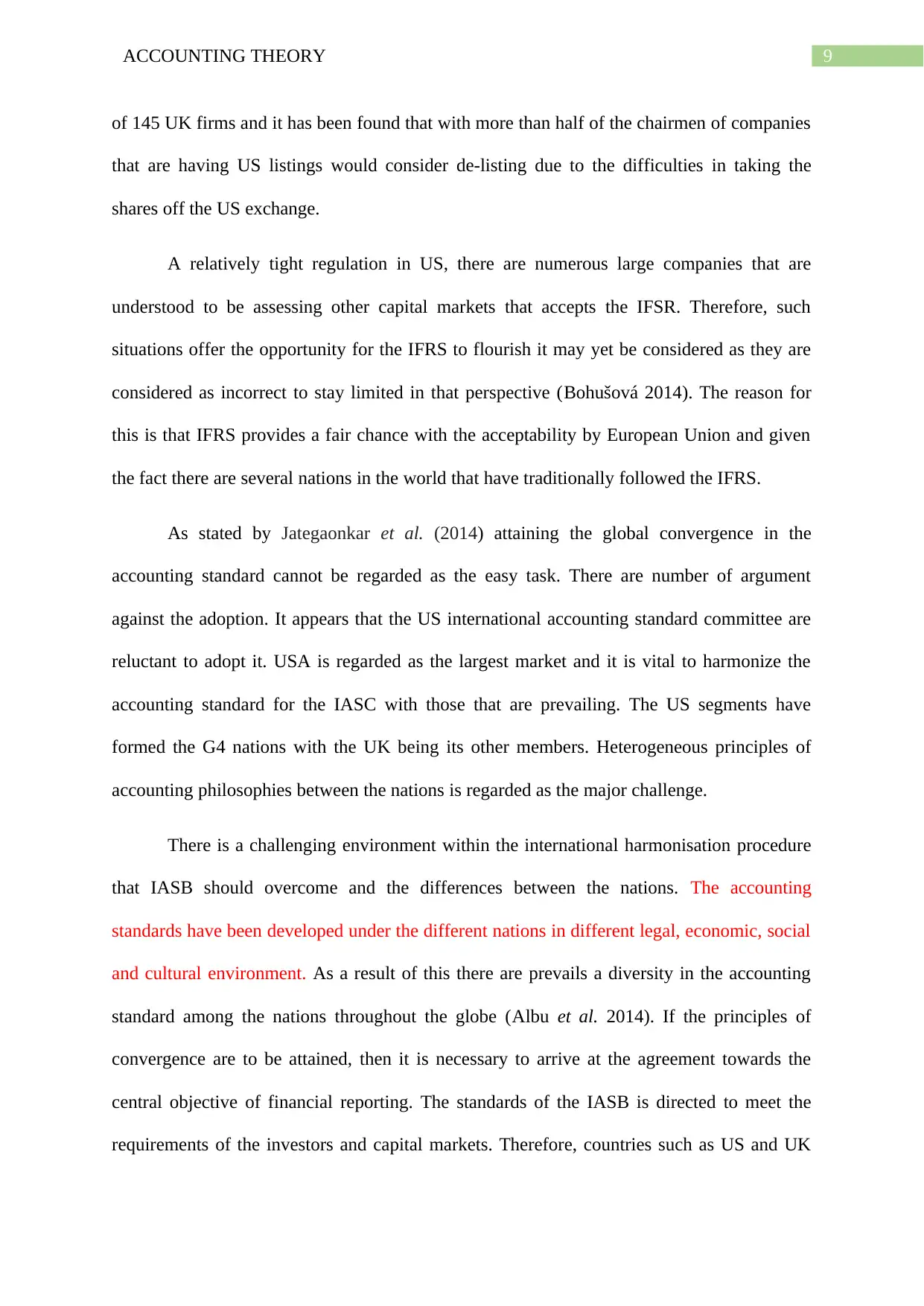
9ACCOUNTING THEORY
of 145 UK firms and it has been found that with more than half of the chairmen of companies
that are having US listings would consider de-listing due to the difficulties in taking the
shares off the US exchange.
A relatively tight regulation in US, there are numerous large companies that are
understood to be assessing other capital markets that accepts the IFSR. Therefore, such
situations offer the opportunity for the IFRS to flourish it may yet be considered as they are
considered as incorrect to stay limited in that perspective (Bohušová 2014). The reason for
this is that IFRS provides a fair chance with the acceptability by European Union and given
the fact there are several nations in the world that have traditionally followed the IFRS.
As stated by Jategaonkar et al. (2014) attaining the global convergence in the
accounting standard cannot be regarded as the easy task. There are number of argument
against the adoption. It appears that the US international accounting standard committee are
reluctant to adopt it. USA is regarded as the largest market and it is vital to harmonize the
accounting standard for the IASC with those that are prevailing. The US segments have
formed the G4 nations with the UK being its other members. Heterogeneous principles of
accounting philosophies between the nations is regarded as the major challenge.
There is a challenging environment within the international harmonisation procedure
that IASB should overcome and the differences between the nations. The accounting
standards have been developed under the different nations in different legal, economic, social
and cultural environment. As a result of this there are prevails a diversity in the accounting
standard among the nations throughout the globe (Albu et al. 2014). If the principles of
convergence are to be attained, then it is necessary to arrive at the agreement towards the
central objective of financial reporting. The standards of the IASB is directed to meet the
requirements of the investors and capital markets. Therefore, countries such as US and UK
of 145 UK firms and it has been found that with more than half of the chairmen of companies
that are having US listings would consider de-listing due to the difficulties in taking the
shares off the US exchange.
A relatively tight regulation in US, there are numerous large companies that are
understood to be assessing other capital markets that accepts the IFSR. Therefore, such
situations offer the opportunity for the IFRS to flourish it may yet be considered as they are
considered as incorrect to stay limited in that perspective (Bohušová 2014). The reason for
this is that IFRS provides a fair chance with the acceptability by European Union and given
the fact there are several nations in the world that have traditionally followed the IFRS.
As stated by Jategaonkar et al. (2014) attaining the global convergence in the
accounting standard cannot be regarded as the easy task. There are number of argument
against the adoption. It appears that the US international accounting standard committee are
reluctant to adopt it. USA is regarded as the largest market and it is vital to harmonize the
accounting standard for the IASC with those that are prevailing. The US segments have
formed the G4 nations with the UK being its other members. Heterogeneous principles of
accounting philosophies between the nations is regarded as the major challenge.
There is a challenging environment within the international harmonisation procedure
that IASB should overcome and the differences between the nations. The accounting
standards have been developed under the different nations in different legal, economic, social
and cultural environment. As a result of this there are prevails a diversity in the accounting
standard among the nations throughout the globe (Albu et al. 2014). If the principles of
convergence are to be attained, then it is necessary to arrive at the agreement towards the
central objective of financial reporting. The standards of the IASB is directed to meet the
requirements of the investors and capital markets. Therefore, countries such as US and UK
Paraphrase This Document
Need a fresh take? Get an instant paraphrase of this document with our AI Paraphraser
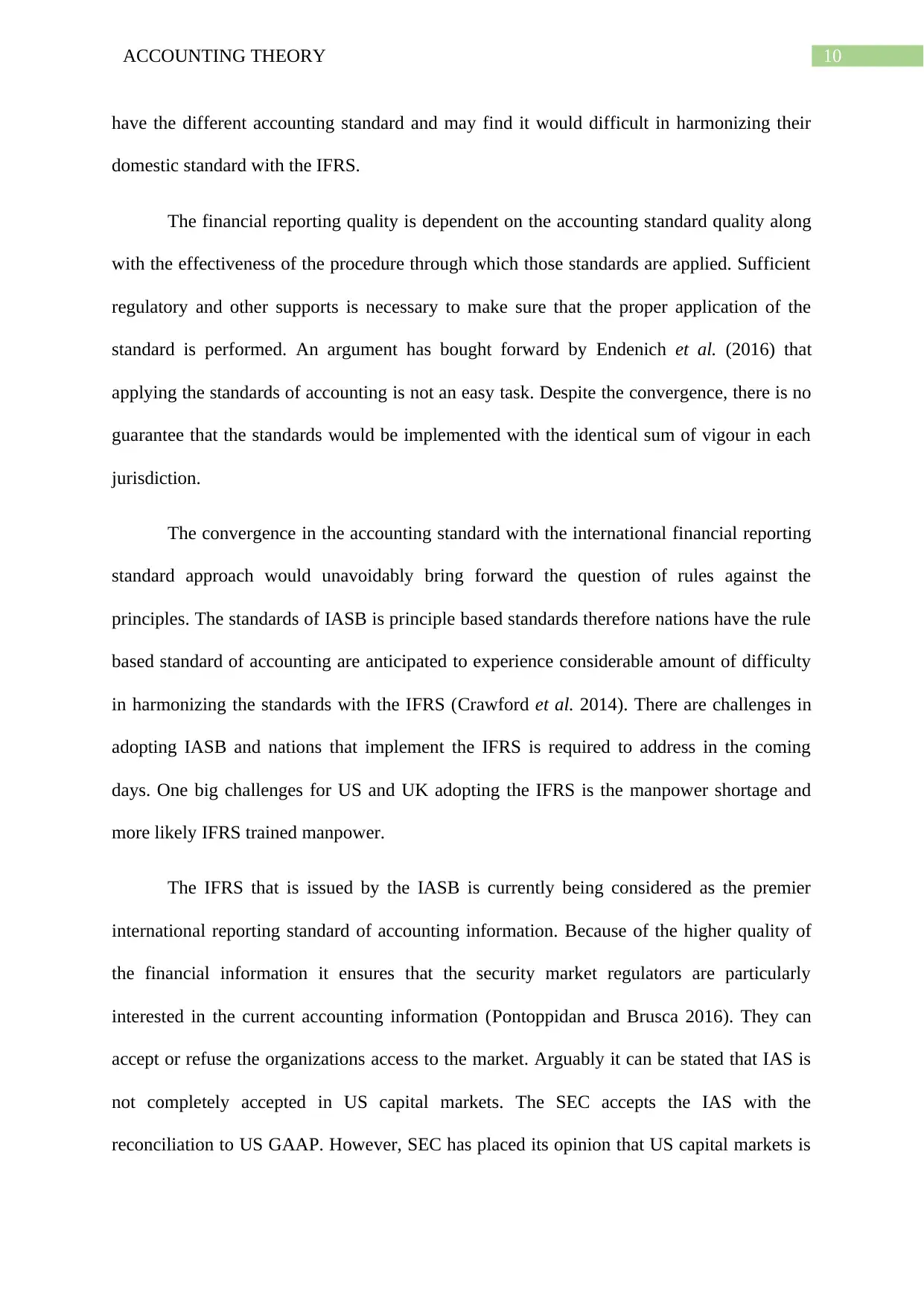
10ACCOUNTING THEORY
have the different accounting standard and may find it would difficult in harmonizing their
domestic standard with the IFRS.
The financial reporting quality is dependent on the accounting standard quality along
with the effectiveness of the procedure through which those standards are applied. Sufficient
regulatory and other supports is necessary to make sure that the proper application of the
standard is performed. An argument has bought forward by Endenich et al. (2016) that
applying the standards of accounting is not an easy task. Despite the convergence, there is no
guarantee that the standards would be implemented with the identical sum of vigour in each
jurisdiction.
The convergence in the accounting standard with the international financial reporting
standard approach would unavoidably bring forward the question of rules against the
principles. The standards of IASB is principle based standards therefore nations have the rule
based standard of accounting are anticipated to experience considerable amount of difficulty
in harmonizing the standards with the IFRS (Crawford et al. 2014). There are challenges in
adopting IASB and nations that implement the IFRS is required to address in the coming
days. One big challenges for US and UK adopting the IFRS is the manpower shortage and
more likely IFRS trained manpower.
The IFRS that is issued by the IASB is currently being considered as the premier
international reporting standard of accounting information. Because of the higher quality of
the financial information it ensures that the security market regulators are particularly
interested in the current accounting information (Pontoppidan and Brusca 2016). They can
accept or refuse the organizations access to the market. Arguably it can be stated that IAS is
not completely accepted in US capital markets. The SEC accepts the IAS with the
reconciliation to US GAAP. However, SEC has placed its opinion that US capital markets is
have the different accounting standard and may find it would difficult in harmonizing their
domestic standard with the IFRS.
The financial reporting quality is dependent on the accounting standard quality along
with the effectiveness of the procedure through which those standards are applied. Sufficient
regulatory and other supports is necessary to make sure that the proper application of the
standard is performed. An argument has bought forward by Endenich et al. (2016) that
applying the standards of accounting is not an easy task. Despite the convergence, there is no
guarantee that the standards would be implemented with the identical sum of vigour in each
jurisdiction.
The convergence in the accounting standard with the international financial reporting
standard approach would unavoidably bring forward the question of rules against the
principles. The standards of IASB is principle based standards therefore nations have the rule
based standard of accounting are anticipated to experience considerable amount of difficulty
in harmonizing the standards with the IFRS (Crawford et al. 2014). There are challenges in
adopting IASB and nations that implement the IFRS is required to address in the coming
days. One big challenges for US and UK adopting the IFRS is the manpower shortage and
more likely IFRS trained manpower.
The IFRS that is issued by the IASB is currently being considered as the premier
international reporting standard of accounting information. Because of the higher quality of
the financial information it ensures that the security market regulators are particularly
interested in the current accounting information (Pontoppidan and Brusca 2016). They can
accept or refuse the organizations access to the market. Arguably it can be stated that IAS is
not completely accepted in US capital markets. The SEC accepts the IAS with the
reconciliation to US GAAP. However, SEC has placed its opinion that US capital markets is
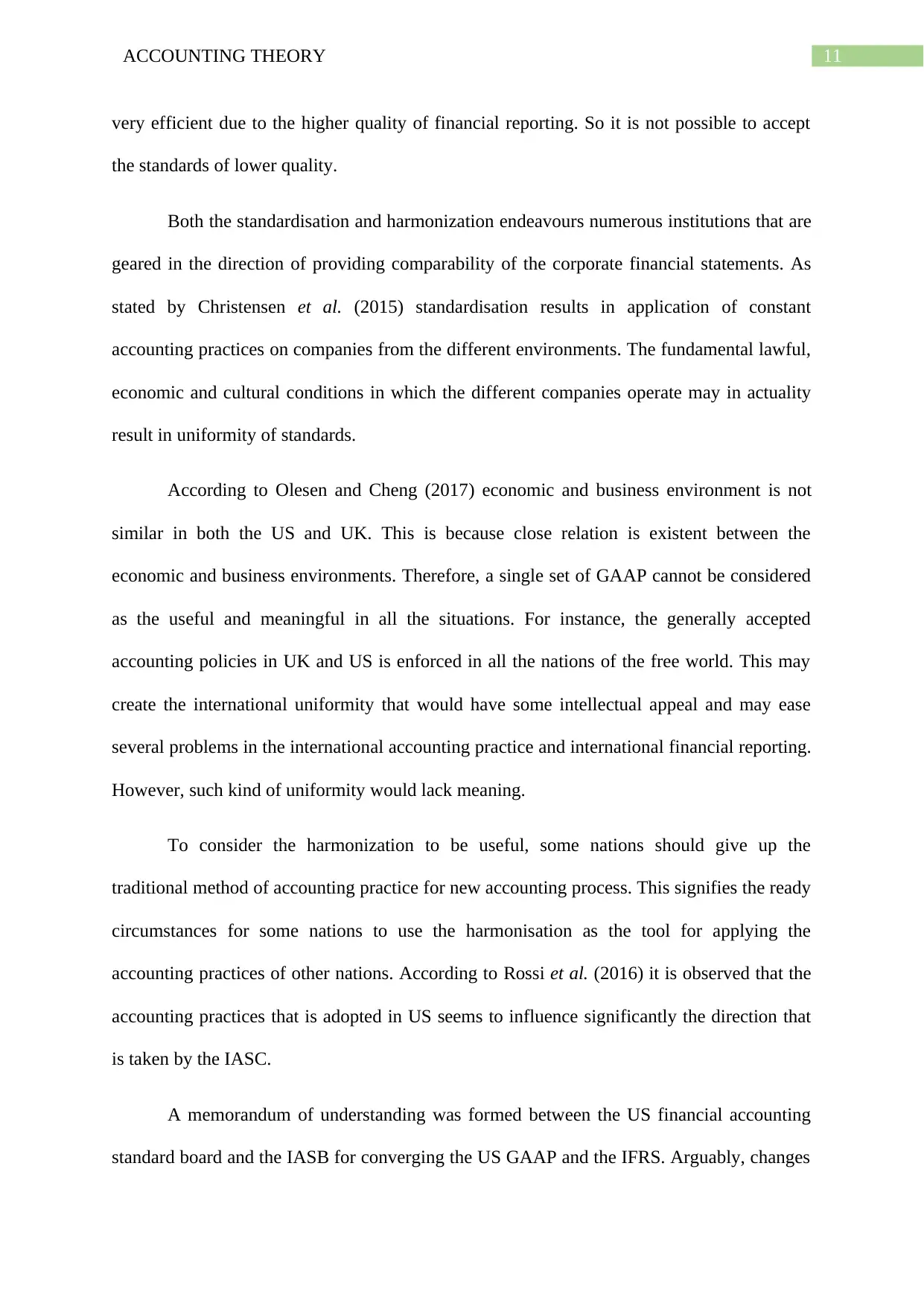
11ACCOUNTING THEORY
very efficient due to the higher quality of financial reporting. So it is not possible to accept
the standards of lower quality.
Both the standardisation and harmonization endeavours numerous institutions that are
geared in the direction of providing comparability of the corporate financial statements. As
stated by Christensen et al. (2015) standardisation results in application of constant
accounting practices on companies from the different environments. The fundamental lawful,
economic and cultural conditions in which the different companies operate may in actuality
result in uniformity of standards.
According to Olesen and Cheng (2017) economic and business environment is not
similar in both the US and UK. This is because close relation is existent between the
economic and business environments. Therefore, a single set of GAAP cannot be considered
as the useful and meaningful in all the situations. For instance, the generally accepted
accounting policies in UK and US is enforced in all the nations of the free world. This may
create the international uniformity that would have some intellectual appeal and may ease
several problems in the international accounting practice and international financial reporting.
However, such kind of uniformity would lack meaning.
To consider the harmonization to be useful, some nations should give up the
traditional method of accounting practice for new accounting process. This signifies the ready
circumstances for some nations to use the harmonisation as the tool for applying the
accounting practices of other nations. According to Rossi et al. (2016) it is observed that the
accounting practices that is adopted in US seems to influence significantly the direction that
is taken by the IASC.
A memorandum of understanding was formed between the US financial accounting
standard board and the IASB for converging the US GAAP and the IFRS. Arguably, changes
very efficient due to the higher quality of financial reporting. So it is not possible to accept
the standards of lower quality.
Both the standardisation and harmonization endeavours numerous institutions that are
geared in the direction of providing comparability of the corporate financial statements. As
stated by Christensen et al. (2015) standardisation results in application of constant
accounting practices on companies from the different environments. The fundamental lawful,
economic and cultural conditions in which the different companies operate may in actuality
result in uniformity of standards.
According to Olesen and Cheng (2017) economic and business environment is not
similar in both the US and UK. This is because close relation is existent between the
economic and business environments. Therefore, a single set of GAAP cannot be considered
as the useful and meaningful in all the situations. For instance, the generally accepted
accounting policies in UK and US is enforced in all the nations of the free world. This may
create the international uniformity that would have some intellectual appeal and may ease
several problems in the international accounting practice and international financial reporting.
However, such kind of uniformity would lack meaning.
To consider the harmonization to be useful, some nations should give up the
traditional method of accounting practice for new accounting process. This signifies the ready
circumstances for some nations to use the harmonisation as the tool for applying the
accounting practices of other nations. According to Rossi et al. (2016) it is observed that the
accounting practices that is adopted in US seems to influence significantly the direction that
is taken by the IASC.
A memorandum of understanding was formed between the US financial accounting
standard board and the IASB for converging the US GAAP and the IFRS. Arguably, changes
⊘ This is a preview!⊘
Do you want full access?
Subscribe today to unlock all pages.

Trusted by 1+ million students worldwide
1 out of 16
Related Documents
Your All-in-One AI-Powered Toolkit for Academic Success.
+13062052269
info@desklib.com
Available 24*7 on WhatsApp / Email
![[object Object]](/_next/static/media/star-bottom.7253800d.svg)
Unlock your academic potential
Copyright © 2020–2026 A2Z Services. All Rights Reserved. Developed and managed by ZUCOL.



